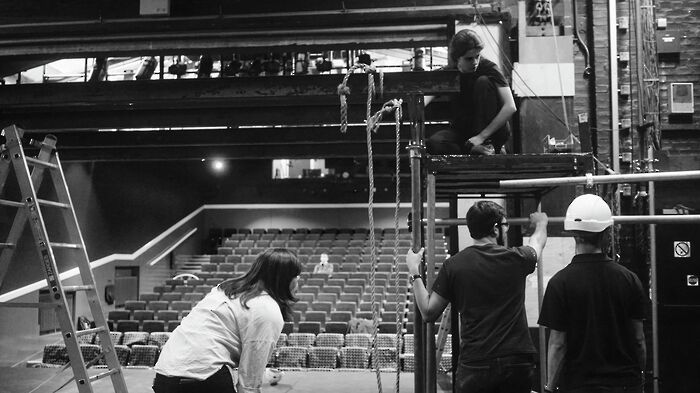This Blood’s For You review
Intricate in its verbal exchange and minimalistic in its set design, this show is full to the brim with talented acting

There’s a common philosophical dilemma – I’m sure you’ve heard of it – which goes something like this: five people lie, tied up on a set of train tracks. You see a runaway trolley moving towards them, but you have an option – pull the lever to redirect the trolley onto a side track, where only one person is lying, or remain a passive observer. It’s a simple moral dichotomy, with no clear answer. What This Blood’s for You does is to take the basic premise of this thought experiment, and to transpose it onto a subtly different scenario, in which the organs of a ‘murderer’ can be harvested to save the lives of a number of innocents. It’s a premise for a play which has the fatal potential to devolve into clichés – the absent father, the corrupted priest and of course, the dilemma of whether several lives are worth more than one.
But This Blood’s for You is a play which does not lapse into cliché, but embraces it, creating a piece which somehow builds upon, and exceeds the very tropes which threaten to topple it. At the centre of it all is Charlie James – convicted murderer – played by Sam Tannenbaum. Brash, self-assured and viciously witty, Tannenbaum’s Charlie presents a figure whose skewed moral direction underlies a play which begins to interrogate some of the darker questions regarding capital punishment and organ donation. Projecting a self-confidence which verges on disillusionment (‘I’m a bad person,’ he says, but there is no real sense of remorse or regret in his words), Charlie functions as the villain with a vendetta against the society which failed to cater for his own unique predicament. In return, he refuses to cater to the requests of ‘civilised society,’ which he perceives to be viewing him as merely a vehicle for organ donorship.
"a play which does not lapse into cliché, but embraces it, creating a piece which somehow builds upon, and exceeds the very tropes which threaten to topple it"
The play itself is ultimately defined by barriers. Indeed, a single, translucent curtain divides the Corpus Playroom into two diagonal halves: it functions as the barriers of Charlie’s cell, but also operates as a signifier of the social and metaphorical divides which separate Charlie and those who interview him from the safety of the other side of this wall. The performance often crosses that fine line between comedy and tragedy, frequently oscillating between the two, and as a disparate collection of figures appear to interrogate Charlie, the play often borders on the ridiculous. Mariam Abdel-Razek, playing the warden’s naïve son (Patrick Jr), effectively conveys the immaturity of her character, whose subtle, dry humour provides a counterpoint to Charlie’s brash American humour. The two characters play effectively off each other, with Charlie performing the role of the anti-status-quo revolutionary, and Patrick Jr the innocent school-kid; it feels like an interplay between a pedagogic figure (Charlie) and his quietly listening student (Patrick).
As a series of increasingly eccentric figures (a warden, a governor and a priest) gradually attempt to appeal to Charlie’s conscience, pathos transitions into comedy. In a fascinating switch of authority, we realise that it is now Charlie who is empowered by virtue of his capacity as a potential organ donor. Particular mention must go to Father John (portrayed by Ben Vince) whose hackneyed aphorisms, as well as his blatant alcoholism combined to present a hilarious parody of a corrupted priest. His over-dramatic persona provided a perfect antithesis to Charlie’s carefully calculated wit, such that his appearances became a kind of comic interlude, reminiscent of the porter in Macbeth or the gravedigger in Hamlet. Although the flow of the play was at times interrupted by verbal clichés (‘I’m not afraid of death, but I am afraid of dying’) and unconvincing scenes (one in particular with a telephone seemed a little abrupt and implausible), this did very little to stand in the way of what was largely a very impressive performance, minimalistic in its set design and intricate in its verbal exchange.
This Blood’s for You is ultimately a problem play, exploring several moral issues as well as a cross-culture of American society which paints a pessimistic vision of social mobility. It touches on these social problems, but also does a remarkable job of not inspecting them seriously enough so as to become banal or too grave, thereby situating itself on the fault line between genres. At the heart of it lies the justification behind capital punishment (‘how can murder justify murder?’) and organ donation, but these issues are touched upon with a light hand and a skilled performance, which deserves to be seen, and not explained.
 News / Cambridge academics stand out in King’s 2026 Honours List2 January 2026
News / Cambridge academics stand out in King’s 2026 Honours List2 January 2026 Interviews / You don’t need to peak at Cambridge, says Robin Harding31 December 2025
Interviews / You don’t need to peak at Cambridge, says Robin Harding31 December 2025 Comment / Plastic pubs: the problem with Cambridge alehouses 5 January 2026
Comment / Plastic pubs: the problem with Cambridge alehouses 5 January 2026 News / AstraZeneca sues for £32 million over faulty construction at Cambridge Campus31 December 2025
News / AstraZeneca sues for £32 million over faulty construction at Cambridge Campus31 December 2025 News / Cambridge businesses concerned infrastructure delays will hurt growth5 January 2026
News / Cambridge businesses concerned infrastructure delays will hurt growth5 January 2026









